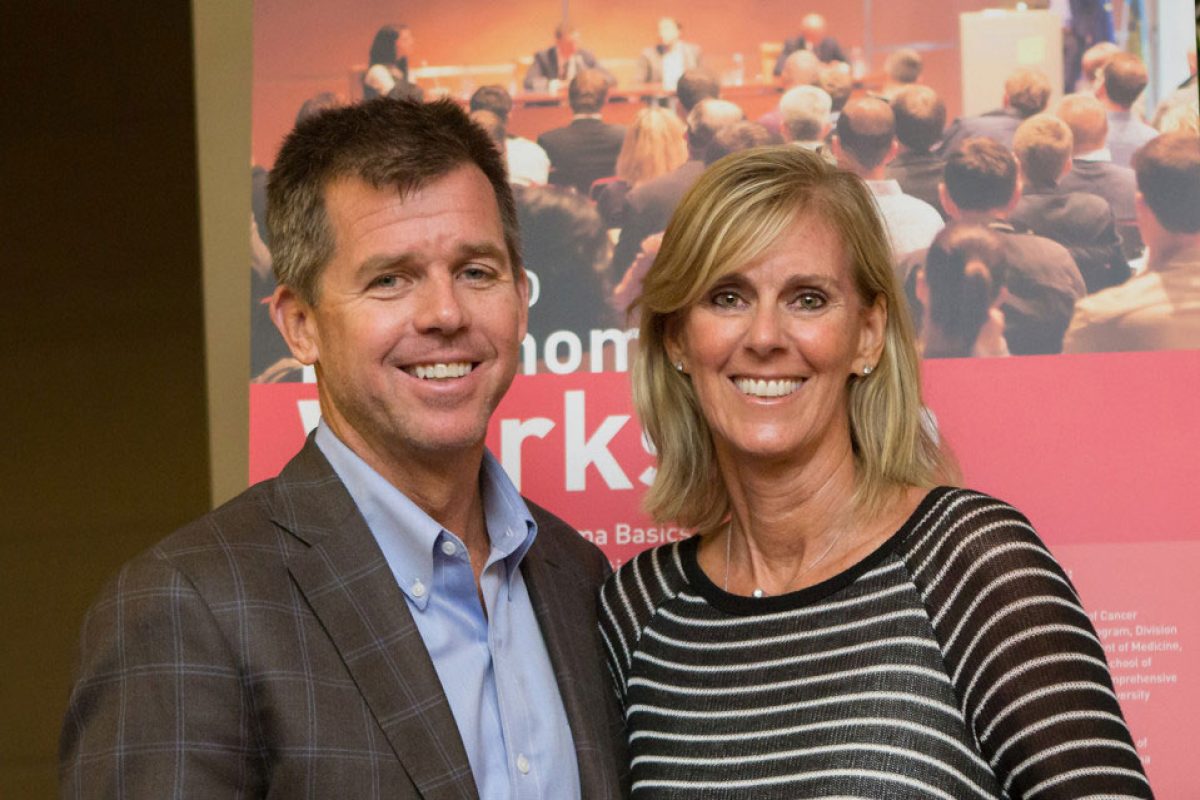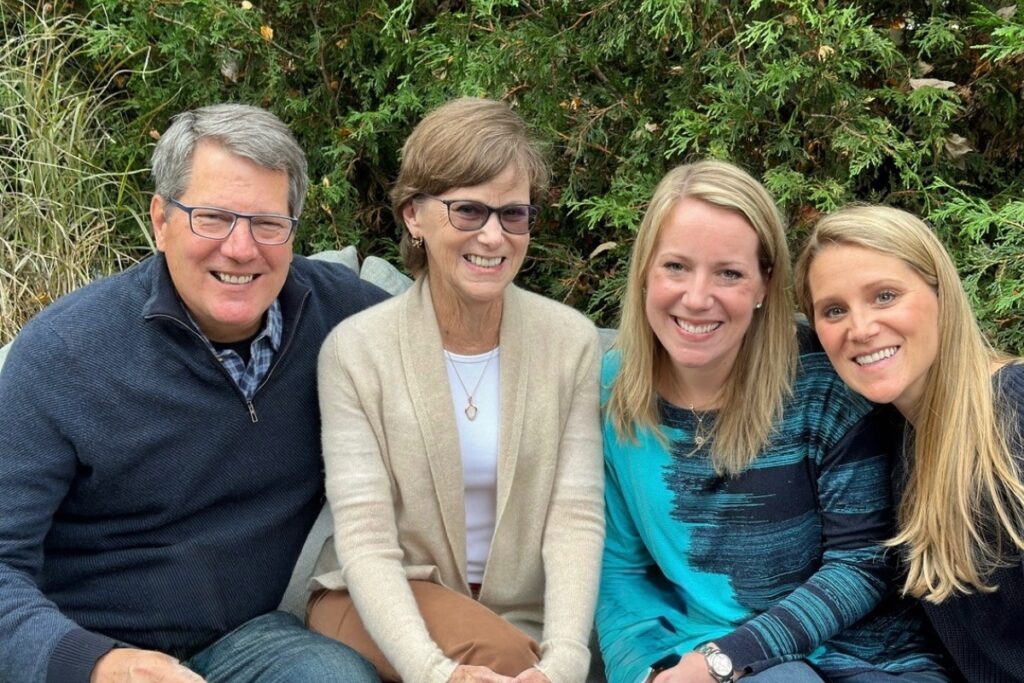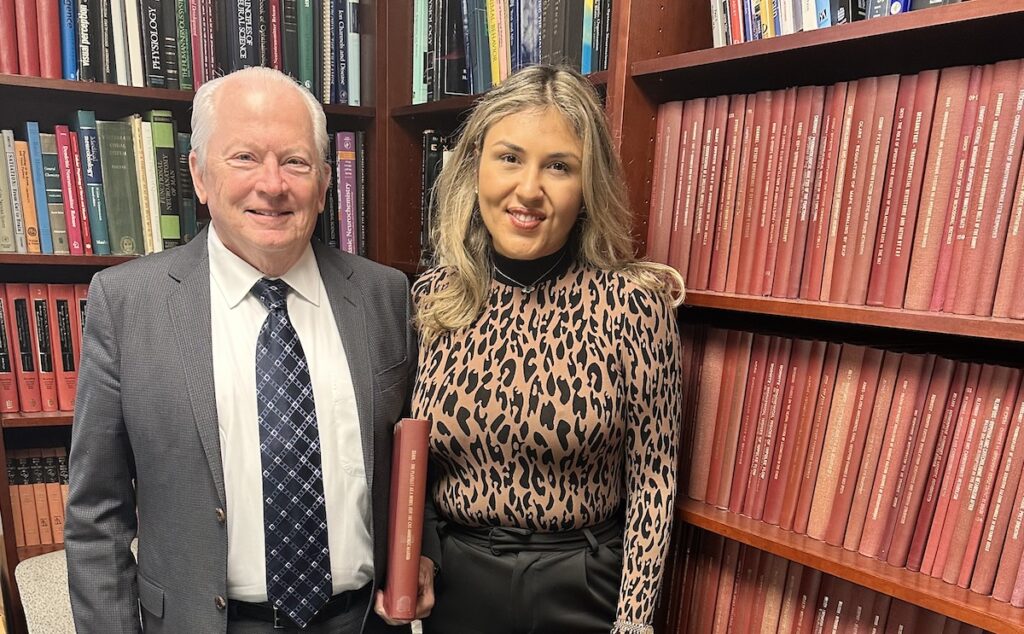If you’ve spent any time in the Midwest, you may be familiar with the iconic orange and green signs of Family Video, the last American video rental chain in the United States and Canada. The family-owned business has stood the test of time, outlasting competitors like Blockbuster and enduring in the age of Netflix and Hulu.
The Hoogland family has operated Family Video for more than 40 years, building a community of loyal employees and patrons along the way. This sense of community was in part solidified by a culture of philanthropy nurtured by president Keith Hoogland and his wife, Susan.
They first launched their annual raise-at-the-register “Round It Up for Lymphoma” campaign in 2012 to support blood cancer research through the Lymphoma Research Foundation and the University of Chicago Medicine. That year, they hoped to raise about $500,000. They ended up raising more than $1 million.
“I realized then that our company had been lacking in something—a team-building event around doing something good,” Keith said. “It was something that was really eye-opening to me—how you can bring a company together around a common cause. The campaign really brought people together and now it has a mind of its own.”
Since its inception, Round It Up has raised more than $4 million for the research of Sonali Smith, MD, director of UChicago Medicine’s Lymphoma Program, allowing her to launch the Hoogland Lymphoma Biobank in 2013. Smith has since collected more than 1,000 blood samples and nearly 500 tissue samples— which are used to help researchers better understand the disease—from nearly 1,500 patients.
“Watching the biobank grow and seeing the research that has come out of it makes me feel confident that we are, together, making an impact on this complex disease,” Smith said.
Building on the success of the biobank, the Hooglands began thinking about how they could support research on other cancer types to have an even greater impact. Their ambition inspired Smith to introduce them to Thomas Gajewski, MD, PhD, the AbbVie Foundation Professor of Cancer Immunotherapy, and one of the world’s leading experts in his field.
In 2018, Gajewski made the landmark discovery that the microbiome (bacteria in the gut) plays a role in how patients respond to immunotherapy—treatments that use the natural defenses of the immune system to fight cancer. He and his colleagues have an ambitious goal: double the immunotherapy response rate in 10 years or less. His vision has inspired the Hooglands to pledge $5 million toward accelerating cancer immunotherapy research at UChicago Medicine so more patients can benefit from the life-saving therapies.
“I’m a problem solver and that’s one of the things that connected me to Dr. Smith and Dr. Gajewski,” Keith said. “There is a long-term goal: solve lymphoma or—through immunotherapy—solve the riddle of cancer. I think of it as an investment in something that has a good chance of working or will lead to something—some big breakthroughs.”
By focusing research on the patients for whom immunotherapies fail, Gajewski aims to identify, understand, and overcome the defenses that cancers use to escape or withstand immune attack.
“It’s the Anna Karenina principle,” he said, referencing the famed novel by Russian author Leo Tolstoy. “‘All happy families are alike; each unhappy family is unhappy in its own way.’ When immunotherapy works, it’s following all the rules, but when it doesn’t there are likely multiple reasons why.”
Gajewski and his colleagues have identified three key factors that play major roles in immunotherapy response: the patient’s genetics, the tumor’s genetics, and the patient’s microbiome. These three factors are incredibly complex and untangling this complexity will require huge amounts of data. Over the past few years, Gajewski’s team has been collecting tumor, tissue, blood, and stool samples from hundreds of patients participating in immunotherapy clinical trials. These banked samples represent a gold mine of data for understanding what helps one patient’s response and what hinders another’s.
The Hoogland’s generous gift will help Gajewski identify those reasons so more cancer patients can benefit from all that immunotherapy has to offer. “Philanthropy fills in the gaps,” he said. “It allows researchers to take risks and tackle the big ideas. Keith and Susan’s generosity will have a profound impact on our understanding of immunotherapy response and ability to develop treatments that help the most patients.”
The Hoogland’s gift comes amid a groundswell of support for immunotherapy research at UChicago Medicine from donors who recognize that the institution is uniquely positioned to drive cancer discoveries and innovative treatments. Gajewski also recently received funding support from an anonymous donor who shares the Hoogland’s enthusiasm for his transformative work. And, in parallel, a gift from the Jonas family established the David and Etta Jonas Center for Cellular Therapy, which will support research aimed at extending the benefits of cellular immunotherapies to more patients, including those with cancers that are difficult to treat. This trio of multimillion-dollar gifts—coupled with UChicago Medicine’s unmatched expertise in immuno-oncology, dedicated leadership, and state-of-the-art facilities—will help the institution bring big ideas to fruition.
“It was our mission together to give bigger to make a larger impact,” Susan said. “It’s really important to us to lead by example, and we want our family to feel and see and do the same thing and carry this on.”
Just as the Hooglands have worked to cement Family Video’s legacy, they are also dedicated to ensuring the family’s commitment to giving back is carried on for generations to come.
“What I want to be remembered for is building a really strong, enduring company and leading a family that is philanthropic through the generations because that’s going to have a bigger impact over time,” Keith said. “I enjoy the idea of making a big difference to our employees and through a legacy of charitable giving.”
Published November 2020




